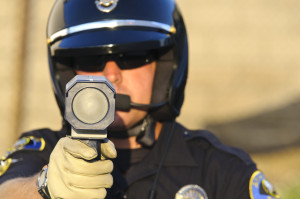Plan would give radar guns to local police in Pennsylvania

By Andrew Staub | PA Independent
Pennsylvania motorists have long been able to set their cruise control a little bit faster if they know they’re driving on a road where local police enforce the speed limit.
That’s because Pennsylvania law only allows state police to use radar guns. Local police must rely on more primitive technology, such as using a stop watch to time cars traveling between two white lines painted on the street.
TECHNOLOGY DIVIDE: Pennsylvania is the only state that prohibits local police from using radar to nab speeders. There’s another push to change that this year.
Given that radar technology has been around since World War II, state Sen. Randy Vulakovich, R-Allegheny, believes it’s time Pennsylvania ends its long run as the only state to prohibit local officers from using radar.
“It’s insulting to a vast, vast majority of police departments that someone would say we can’t give it to them, we can’t trust the police department with radar,” he said. “I mean, does that make sense to you?”
Vulakovich, a former Shaler Township police officer, has introduced legislation that would allow local departments to use radar. Two other bills in the state House would do the same.
The Pennsylvania State Mayors’ Association is part of group called the Radar Coalition that supports the legislation, arguing radar would improve public safety on roads that aren’t patrolled by state police.
The coalition has cited statistics from the National Highway Traffic Administration that found Pennsylvania had the third-highest number of speeding fatalities and the second-highest percentage of speeding fatalities to total fatalities in the country in 2011.
The numbers of speeding fatalities on roads where police cannot use radar were three to six times higher than on roadways where police can use radar, according to the coalition.
“It’s pretty dramatic, actually,” said Whitehall Mayor Jim Nowalk, president of the Pennsylvania State Mayors’ Association.
Still, not everyone is convinced the push for radar is chiefly about public safety.
The National Motorists Association has long opposed bills such as Vulakovich’s proposal, spokesman John Bowman said. Local police tend to have oversight of the proper use, calibration and maintenance of radar equipment, and that can lead to inaccurate tickets, he said.
Plus, there’s also the specter of the small-town speed trap, Bowman said.
“Having the ability to quickly read the alleged speed of any number of motorists in a short period of time would really facilitate that,” he said, “and speed traps are really not about safety. They’re about generating revenue for the cities that set them up.”
Nowalk discounted that theory, saying it doesn’t make sense for municipalities to expect profit from something they are trying to deter — in this case, speeding. He’s never had anybody contact him with a complaint that police enforce speed limits too aggressively, he said.
“But I’ve had a number of people come that say, ‘They’re speeding on my street. You’ve got to do something about it,’” Nowalk said.
Dane Merryman, executive director of the Pennsylvania Chiefs of Police Association, said it’s easy for motorists to think speeding tickets are a profit-maker, given their cost. But, he said, after proceeds from fines go toward emergency medical services and court costs, there’s little left to even cover the cost of the enforcement.
“The fact of the matter is the police department doesn’t get much out of that,” Merryman said.
The debate over radar has lingered for decades, said Vulakovich, who remembers officers questioning why they couldn’t use the technology as far back as the 1970s. The lawmaker had heard in the past that state police didn’t want to give up the exclusive right to the technology, but said he’s gotten word now that they’re not opposed to local departments having the tool, too.
Supporters of the legislation are optimistic about its chances this year, even though similar bills have failed before.
For now, local police will still be at a disadvantage compared to their state counterparts, while drivers can push the pedal a little harder off the interstate. Under state law, police that don’t use radar have to clock drivers at 10 mph over the speed limit instead of the 6 mph needed when using radar.
The arrangement just doesn’t seem right to Vulakovich.
“It’s almost silly,” he said.
Andrew Staub is a reporter for PA Independent and can be reached at Andrew@PAIndependent.com. Follow @PAIndependent on Twitter for more.







